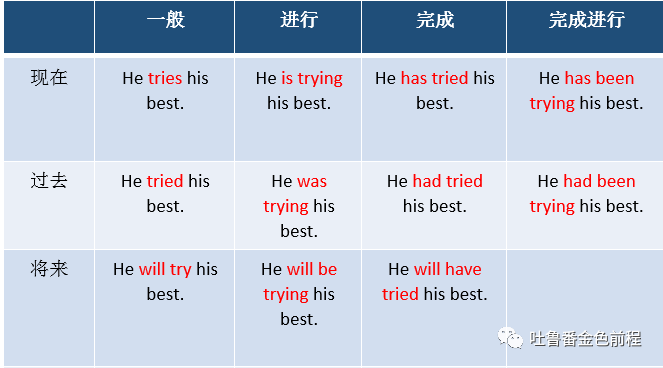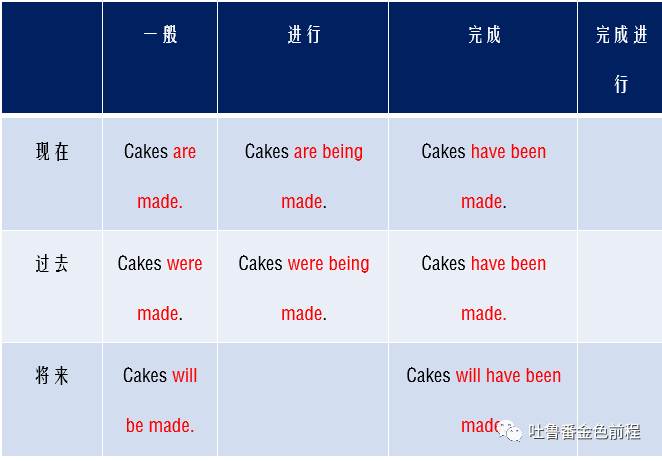- 翰林提供学术活动、国际课程、科研项目一站式留学背景提升服务!
- 400 888 0080
谓语动词的形式之时态,语态和主谓一致
动词的分类
动词:表达行为动作或状态。分行为动词、联系动词、帮助动词、及物动词、不及物动词等。
行为动词 pull/drop/receive/graduate/lock/(及物动词、不及物动词、瞬间动词和延续动词)
状态动词 have /belong/like/own/want/think/believe/argue/maintain/regard/claim /see/find/spot/possess
联系动词 be/feel/taste/smell/look/
帮助动词 will/can/should/does/did/have
短语动词 look for /take on/ apply for /work on/dress up
按照功能还可分为谓语动词和非谓语动词(包括动名词、现在分词、过去分词和不定时动词)
谓语动词
①Leave!
②No> is free from making mistakes.
③Pandas are well protected in the Natural Reserve.
④The Internet has totally transformed our lifestyle.
⑤By 2020, the high speed train will have been put into use.
非谓语动词
①动名词 Smoking does harm to your health.
②现在分词 Having smoked for 20 years, my Dad is unlikely to quit it .
③过去分词 Treated with unfairness , the visiting scientists didn’show up in the conference.
④不定时动词 To gain benefits, some businessmen cut the trees before they fully grow.
谓语动词有时间的变化;注意动词try在下列句子中的时间差异

时态的区别
1. 现在完成时态和过去时态
I have eaten lunch.(对现在有影响,暗指现在不饿)
I ate lunch.(仅代表过去行为,可能是昨天吃的,和现在无关系)
I have lost my cell-phone.(表达手机现在不在了,没有手机可以用) I think I lost it at the train station.(强调过去行为)
2. 过去时态和过去完成时态
过去完成时态不单独使用,必须同另外一个行为进行对比。
Tom had completed his homework when he returned home.(过去完成时行为先于一般过去时态行为完成)
但 Tom completed his homework before he returned home. (这里没有用过完,因为before活着after 本来就表达了动作的先后关系)
3. 现在进行时态和现在完成进行时态
进行时只表达此刻进行,现完进强调一直不停!
The boys are playing soccer now.(此刻在玩)
The boys have been playing soccer for 3 hours.(一直不停,强调现在也许很累的结果)
4.现在完成时态和现在完成进行时态
现完表终止和结果;现完进强调一直不停!
My dad has learned to drive.(表达学会了)
My dad has been learning to drive.(一直不停,依旧在学)
注意:常见的现完时状(常用现完和现完进)
over/in /during /for the past 10 years.
e.g.: Great changes have taken place in China over the past decades.
During the past 3 hours , the boys have been playing soccer
for 10 years(如果行为并非持续到现在,用过去时态)
Before China, he lived in Australia for about 10 years.
since 10 years ago
Since this morning, I have been having this headache.
He has mastered 5 languages since he entered the college.
recently/ lately / of late/ in recent years.
In recent years, online shopping has been more and more popular with teenagers.
so far / up to now / by now / up till now
3 times / 序数词
He has been to Toronto 3 times.
It is the third time that he has been to Toronto.(如果,is 改为was , 则定从的现完改为过完。)
already / yet/ ever
5.Be going to 结构和will do将来时态
有迹象表面将会发生的行为,be going to
e.g.: There are clouds in the sky ; it is going to rain soon.
表达准备和打算,有计划做的行为,用be going to 或者用现在进行时态表达将来的结构
We are going to throw a party for our teacher , Miss Zhao.
或者:We are throwing a party for our teacher , Miss Zhao.
时态的特殊用法
1.现在时态表将来
①The plane takes off at 5 o’clock.
②As soon as he calls back , I will contact you.
进行时态标将来
I am going to Canada and staying there for a week or so.
2.进行时态表抱怨或赞誉
He is always telling lies.
3.过去时态表过完
The professor changed his finger before he sucked it .
4.过去将来时态表过去习惯
I recalled my Dad would put me> shoulders whenever he sent me to school.
时态练习(基础)
When she (ring) the office this morning, Jim (leave)
I (type) all your letters. The job is done .(type)
She (drive) the same car for fifteen years.
He (dine) with a young lady when I met him on the other day .
Water (boil) at 100 ℃ .
I’m tired. I (play )soccer for the whole afternoon.
We (take off )in a few minutes,so fasten your seat-belt.
By the end of this week, I (wait)2 years for her to return.
动词的语态

注意动词不使用被动的动词
状态动词无被动
① This house belongs to my uncle.
② The temple dates back to Song Dynasty.
不及物动词无被动
happen /break out / last /rise /take place
联系动词无被动
feel / taste / smell/ keep/become/ remain/turn out /come true/ go bad/seem / sound
个别动词主动表被动
①The book sells well.
②The house is to let.
③The dog is to blame.
④The door won’t shut.
1. When fat and salt (remove) from food, the food tastes as if it is missing something.
2. In the 1950s in the USA, most families had just> (invent) yet.
3. Truly elegant chopsticks might (make) of gold and silver with Chinese characters.
4. Shakespeare’s play Hamlet (make) into at least ten different films over the past years.
5. If nothing (do), the oceans will turn into fish deserts.
6. The school board is made up of parents who (elect) to make decisions about school affairs.
动词的主谓一致
1.核心原则:主语如果是短语,找到核心词
2.就近原则:特殊并列句和完全倒装句中,找到最近主语
3.匹配原则:主语不清时,通过主谓搭配关系,由动词确定主语
4.注意集体名词、不可数名词、单复数同形、从句、动名词不定代词、形容词做主语等特殊主语。
主谓一致-核心原则
Fruit as well as vegetables is important to keeping fit.
as well as /in addition to /besides/among others/with/including/along with /together with
None of / some of /the majority of /few of
主谓一致-就近原则
①三种复合主语 not only…but also; either or ;neither… nor
Not only water but also plants and animals are invaluable resources .
①完全倒装句和there be 句型
There stands a temple and several old houses> the top of the mountain.
In front of the temple stands a memorial and some trees.
个别特殊主语的主谓一致情况
①The elderly are supposed to be cared for .
②A needle and thread was found on the floor.
③The police are searching for the suspect.(people;media/data/deer/sheep /men/women)
④News/politics/physics/
⑤Our community is in charge of 500 households.
⑥Our community are (be)collecting trash on the beach.
⑦The news on the paper reads that an quake occurred in Sichuan .
动词的主谓一致练习
1.All we need (be) a small piece of land where we can plant various kinds of fruit trees throughout the growing seasons of the year.
2. The famous musician, as well as his students, (invite) to perform at the opening ceremony of the 2012 Taipei Flower Expo.
3. Leaving the less important things until tomorrow (be) often acceptable.
4. Over 75% of the surface on the earth (be)covered by water.
5. South of the river (be)small towns, most of which (depend) on fishing for a living .
来自吐鲁番金色前程

早鸟钜惠!翰林2025暑期班课上线

最新发布
© 2025. All Rights Reserved. 沪ICP备2023009024号-1








